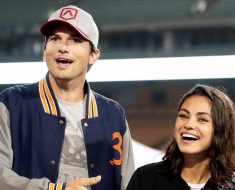Being a caregiver is one of the most selfless roles a person can take on, especially when the individual in need of care is a loved one. As altruistic as caregiving is, it’s also incredibly emotionally taxing. In addition to the round-the-clock care needed, a person suffering from a terminal disease heartbreakingly becomes less and less of who they were pre-diagnosis due to their illness taking hold of them — and these celebrities know just how difficult it is to watch their aging parents’ decline.
Many celebrities, including Maria Shriver and Bryan Cranston, have been caregivers for parents diagnosed with Alzheimer’s disease. During a 2017 conversation with The Hill, Shriver shared advice for those caring for loved ones suffering from the incurable illness. “You can love the person you’re caring for but hate how challenging the act of caregiving can be,” she said. “Accept that you’re going to have these feelings but then do what you can to surround yourself with love and support so that you don’t become isolated or overwhelmed.”
Other famous folks, like Queen Latifah and Henry Winkler, have watched their parents slowly fade away due to other terminal illnesses. Regardless of the disease that thrust them into a caregiver role for their aging parents, each celebrity has candidly described the mental and emotional taxation caused by the harrowing responsibility.
Scroll on to read the experiences and advice from celebrities who have taken on the role of caregiver for their aging, ailing parents.
-
Queen Latifah

Image Credit: Alberto Rodriguez/Variety via Getty Images. Queen Latifah’s mother passed away from interstitial lung disease (ILD) in 2018. The media maven cared for her until her death, and in 2022, Latifah told SELF, “It was tough, I’m not going to lie.”
The Girls’ Trip actress shared, “I was working a lot, as I always am. I think it was important to take a break sometimes. Take a hike. Take a walk. And try to get some sleep. You know, just escape a little bit.”
She suggested to other caregivers, based on her experience, “Do something that takes you away and makes you happy — something that gives your mind a break and your spirit a break, and allows you to refresh yourself so that you can come back to this real situation with a fresh mind and a positive attitude.”
-
Maria Shriver

Image Credit: Alison Narro/SHE Media via Getty Images. After her father was diagnosed with Alzheimer’s in 2003, Maria Shriver was his caregiver until his death in 2011. During a 2017 Q&A with The Hill, Shriver opened up about caregiver guilt, asserting, “You can love the person you’re caring for but hate how challenging the act of caregiving can be.”
For others taking on the taxing role, she advised, “Do the best you can and remember that you only have so much control over the situation that you’re in. Accept that you’re going to have these feelings but then do what you can to surround yourself with love and support so that you don’t become isolated or overwhelmed.”
Shriver also urged fellow caregivers to share their stories. “Storytelling is a powerful tool, and your voice matters,” she said. “So many people are experiencing what you have and are continuing to experience today. Your challenges, your triumphs, what has helped you will probably help someone else, too.”
-
Seth Rogan

Image Credit: Anna Webber/Variety via Getty Images. Since his mother-in-law was diagnosed with early onset Alzheimer’s at just 55 years old, Seth Rogan has been a caregiver for her alongside his wife, Lauren Miller.
In 2017, the actor told InStyle magazine, per Yahoo! News, how much he admires Miller’s emotional openness toward her mom’s condition, explaining, “It’s been nice to see my wife take control emotionally of a situation that was not very controllable. I think the most impressive thing she does is just talk about it.”
Rogan added, “There’s a lot of shame associated with having Alzheimer’s. Some people don’t want anyone to know. But it’s good to acknowledge it.”
-
Peter Gallagher

Image Credit: Nina Westervelt/Variety/Penske Media via Getty Images. Peter Gallagher cared for his mother for over two decades after she was diagnosed with Alzheimer’s. The actor said at an Alzheimer’s Association event in 2012, “An Alzheimer’s diagnosis can be as devastating to the caregiver as to the person diagnosed.”
-
Amy Grant

Image Credit: Allison Dinner/Getty Images. Along with her three sisters, Amy Grant was a caretaker for both of her parents, who suffered from dementia. The country musician explained the importance of having people to lean on while caregiving, telling Aging Care, “You can’t fix it, but you don’t have to go through it alone.”
-
Henry Winkler

Image Credit: Gilbert Flores/Variety via Getty Images. For 10 years, Henry Winkler and his sister cared for their mother after she suffered a stroke. In 2013, the actor told Spry Living, “My hat is off to caregivers. My respect is at full tilt for caregivers. … The dedication, the patience, just the wear of it all to consistently take care of somebody else — that’s a hero.”
-
Bryan Cranston

Image Credit: Nina Westervelt/Variety via Getty Images. Bryan Cranston was also a caregiver for a parent with Alzheimer’s. His mother was diagnosed with the disease, which ultimately took her life after 14 years of living with the condition. Speaking to fellow caregivers in a 2019 video for Alzheimer’s Research U.K., the actor suggested, “Try the best you can to accept the ‘different’ relationship with your loved one — whatever that may become.”
Cranston shared, “To help me do that, I tried to look for the lighter side of life. A laugh can be very therapeutic — for the patient and the caregiver.” Knowing the emotional distress that comes with the role, he added, “The caregiver is the unheralded hero of humanity. I revere caregivers as I do first responders.”
Source: Read Full Article






